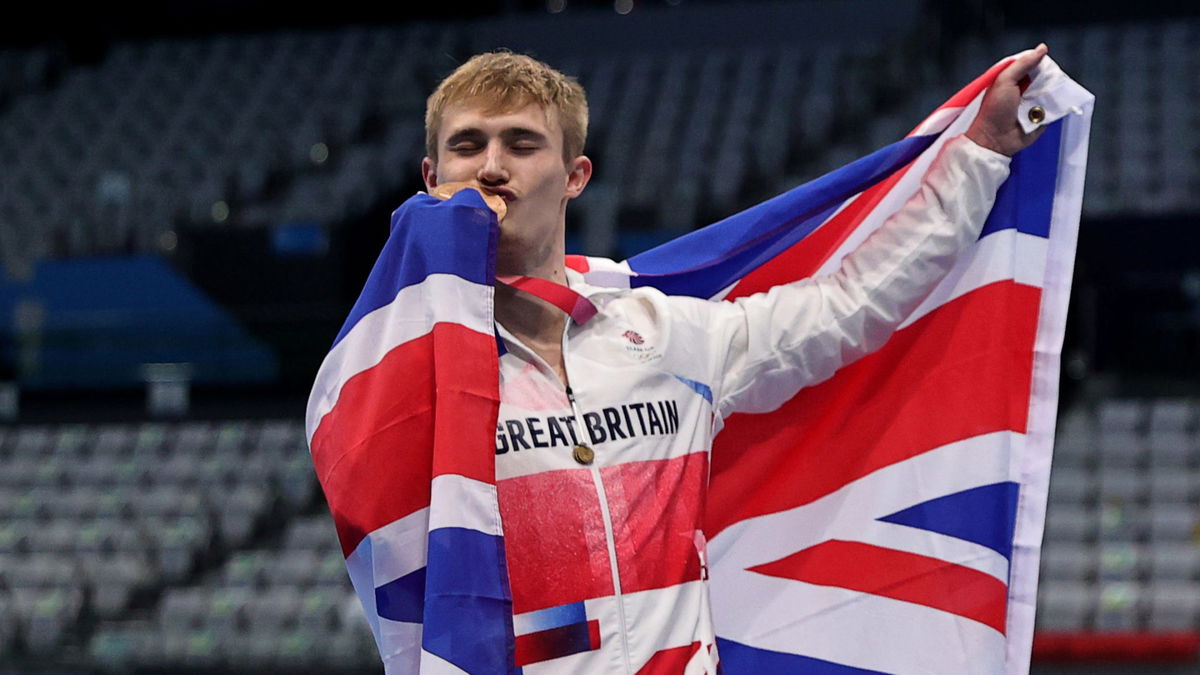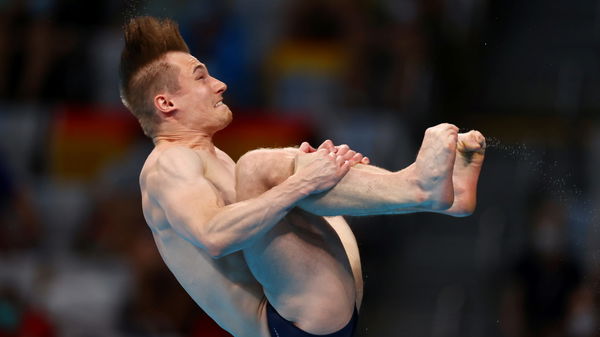
Reuters
Tokyo 2020 Olympics – Diving – Men’s 3m Springboard – Medal Ceremony – Tokyo Aquatics Centre, Tokyo, Japan – August 3, 2021. Jack Laugher of Britain kisses his bronze medal as he carries a flag of Britain REUTERS/Ann Wang

Reuters
Tokyo 2020 Olympics – Diving – Men’s 3m Springboard – Medal Ceremony – Tokyo Aquatics Centre, Tokyo, Japan – August 3, 2021. Jack Laugher of Britain kisses his bronze medal as he carries a flag of Britain REUTERS/Ann Wang
The 3-meter springboard diving competition at Tokyo Olympics 2020 saw the Chinese contingent dominate the headlines. Xie Siyito and Wang Zongyuang claimed the gold and silver medal respectively in a thrilling contest. Likewise, the bronze medal went to Britain’s Jack Laugher.
Watch What’s Trending Now!
Meanwhile, many athletes have opened up about mental health issues in this year’s Olympics. Simone Biles withdrew from the team artistic gymnastics event at the start of the games because of this problem. As more athletes come forward, Jack Laugher opened up about his experiences related to anxiety as well.
Laugher reflected on his preparations for the Olympics as he faced mental health issues before the grand sporting event.
ADVERTISEMENT

Reuters
Tokyo 2020 Olympics – Diving – Men’s 3m Springboard – Final – Tokyo Aquatics Centre, Tokyo, Japan – August 3, 2021. Jack Laugher of Britain in action REUTERS/Antonio Bronic
Laugher opens up about his issues
The bronze medallist recollected tough days heading to Japan after being ‘scared to dive’ because of anxiety issues. Moreover, he stated how the last two years of his life have not gone accordingly and found it tough to deal with the problem.
ADVERTISEMENT
“I’ve been through a lot over the last couple of years and my diving career has really taken a turn for the worst and so has my mental health but this felt like a triumph and a combination of hard work and love and support from a lot of people.”
"I've cried myself to sleep and hit rock bottom… but 𝐭𝐨𝐝𝐚𝐲 𝐰𝐚𝐬 𝐫𝐞𝐝𝐞𝐦𝐩𝐭𝐢𝐨𝐧!" 💪❤️
🇬🇧 @JackLaugher reveals in an honest and open interview that he nearly quit after suffering from diving's version of the 'twisties'#TeamGB | #Tokyo2020 | @SportsOrla pic.twitter.com/Rq9qUDW7ih
— Eurosport (@eurosport) August 3, 2021
ADVERTISEMENT
“I really tried to stay concentrated but as soon as I saw that I was on the podium I just broke down. I was so relieved with everything that I’d overcome and that I’d put everything behind me and I felt like I was finally back to myself again,” said Laugher.
Top Stories
Paramount’s UFC Launch Under Fire After Kourtney Kardashian’s Husband Sparks Backlash

Joe Rogan Shows No Mercy at Rose Namajunas’ Past as She Falls to Natalia Silva at UFC 324

NFL Announces Punishment Decision for Josh Allen’s Bills Following Divisional Round Loss

When 49ers HC Kyle Shanahan Got Arrested Defending Raheem Morris at 2005 NFL Combine

Patrick Reed Willing to End Rory McIlroy Feud Using Bizarre Measure Years After ‘Tee-Gate’

Donald Trump Announces Super Bowl Decision, Slams Halftime Performer Bad Bunny & Green Day

The diver spoke about the troubles he faced leading to the event. Many athletes are now opening up about their issues. The expectations and pressures of nations on these athletes seem to take a toll on them. But, Naomi Osaka and Simone Biles have broken the social stigma, and come out with their issues.
A welcome change for all the taboos to be kicked out of the park.
ADVERTISEMENT
READ MORE-? The Bitter Truth Behind Team USA?s Failure in the Men?s 4x100m Relay at Tokyo Olympics 2020
Jack Laugher wins bronze at Tokyo Olympics 2020
The 3-meter springboard was a tight battle as Laugher won his third Olympic medal. In the early days of his career, he won a gold and silver medal in Rio 2016. The Brit could not contain his happiness after winning the bronze medal at Tokyo Olympics 2020.
ADVERTISEMENT
“There is only so much a man can take but now I’ve got a medal round my neck it feels like it is redemption,” said Laugher.
"We pretty much shouted out 'thank goodness that's over'."
Jack Laugher's parents react after he won an Olympic bronze medal today. https://t.co/f8psGK66rB pic.twitter.com/RyJJSwfSWC
— BBC Yorkshire (@BBCLookNorth) August 3, 2021
The victory sparks as an inspiration for people who deal with mental health issues daily. Jack Laugher wins a lot of hearts for his gutsy performances and ignites a sense of fire for the younger generation to come out on these issues.
ADVERTISEMENT
Every single athlete takes a lot of grit and determination to prepare themselves for the Olympic games. Apart from improving their physical fitness, mental health should be monitored as well. To sum up, opening up about mental health issues is a boon rather than a bane.
WATCH THIS STORY-?Top 10 Greatest Moments in Olympic History
ADVERTISEMENT
ADVERTISEMENT
ADVERTISEMENT